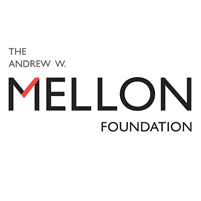Five Andrew W. Mellon Fellows in the Humanities Selected
By Emily Stimmel

In 2014, the Andrew W. Mellon Foundation awarded Carnegie Mellon University a five-year, $2 million grant to transform humanities graduate education by using digital technology to enhance humanities research and improve learning outcomes.
With a well-established legacy of pioneering technology-enhanced learning (TEL) and through the Simon Initiative, a university-wide effort that aims to measurably improve student-learning outcomes by harnessing a learning engineering ecosystem that has developed over several decades at CMU, Carnegie Mellon is uniquely positioned to advance digital scholarship and TEL in the humanities.
Part of the grant supports fellowships for Ph.D. students in the Dietrich College of Humanities and Social Sciences’ English, History, Modern Languages and Philosophy departments who wish to pursue a thesis that centrally involves TEL or digital humanities. The fellowship will enable five students to dig deeper in their dissertation research while polishing their technical skills.
“We’re excited to offer humanities graduate students these unique scholarship opportunities,” said Andy Norman, special faculty in the Philosophy Department and project manager for the fellowship. “The Andrew W. Mellon Foundation is allowing our students to do innovative work at the humanities’ new digital frontier.”
The fellows will work closely with each other and with Digital Humanities Specialist Scott Weingart to integrate technology — from interactive maps to digital dictionaries and rhetorical analysis software — in their projects.
“The applicants were all very impressive, and it was difficult narrowing down the candidates—a great sign given that this is only our first year offering the fellowship,” Weingart remarked. “This year's cohort will push the boundaries of contemporary humanities research, access and education, with project topics ranging from improving second-language acquisition to analyzing and making more accessible post-war records on a grand scale.”
María Pía Gómez Laich, Second Language Acquisition
Modern Languages Department
Gómez Laich is investigating whether task complexity affects writing performance among second-language learners. Using the text analysis software DocuScope — a dictionary-based program that identifies, classifies and stores word strings — she will look for trends that indicate academic writing development among second-language learners, including increased use of linguistic and rhetorical features often found in academic writing.
Current research focuses on the accuracy, fluency and complexity of speech production. Gómez Laich seeks to fill a gap in this body of research by concentrating on writing performance.
Gómez Laich has attended intensive workshops in digital humanities and TEL at CMU, which provided her with a broad overview of digital humanities research. She hopes to build on this foundation with self-guided readings about computer-aided rhetorical analysis and training from DocuScope co-creator and English Professor David Kaufer in the use of the software.
Susan Grunewald, History
History Department
Grunewald’s dissertation examines German prisoners of war in the U.S.S.R. from 1941 to 1956. Drawing from memoirs and archival sources, Grunewald is investigating international relations, the motives of the Soviet government in delaying repatriation and narratives that prisoners in East and West Germany constructed after their return.
She will use the GIS (geographical information system) mapping tool ArcGIS to create a series of maps tracking POW populations, their labor contributions and the locations of the camps in urban and rural settings.
In addition to enhancing Grunewald’s mapping skills, the fellowship funding will allow her to participate in the Digital Humanities Summer Institute hosted by the University of Victoria in Canada, where she will take a coding course. The fellowship will also support research trips to archives in Germany and Russia.
Jessica Harrell, Rhetoric
English Department
Harrell is working on a TEL project exploring how online and digital formats force us to rethink traditional models of discourse. In particular, Harrell is interested in examining the ways that technology enhances learning in the writing classroom and how technology may impact the subject matter that is chosen for teaching.
Harrell looks forward to designing course materials and developing best practices for integrating technology in the classroom. She anticipates that the fellowship will broaden her expertise in writing pedagogy and digital literacy.
The fellowship will support Harrell’s attendance at a summer workshop in Canada where she will learn to create digital humanities courses.
Susan Tanner, Rhetoric
English Department
Tanner has embarked on the first phase of a two-phase project, which involves developing, testing and refining a digital dictionary that will help her evaluate intertextual links in Supreme Court opinions, particularly as they relate to privacy rights.
Building from this dictionary, Tanner plans to apply similar analysis to popular texts including newspaper articles, pamphlets, policy treatises, blog posts and website content.
She looks forward to attending reading groups and workshops and developing the technical skills to execute her project.
Pierce Williams, Literary and Cultural Studies
English Department
With “Buying into Science,” Williams suggests that readers of scientific books played a role in shaping the cultural impact of science in the 18th century. Because these texts were expensive to produce, subscriptions were collected before printing as a way to minimize financial losses. Subscribers’ names were published in lists that accompanied the books and became markers of prestige among the intellectual elite.
Williams is digitizing sociological data from subscription lists of the period in an attempt to understand the demographics of the audience for science publications of the time.
He looks forward to receiving substantial training in computational techniques for managing humanities data, and hopes that developing these skills will help him ask better research questions and answer larger questions in the future. Williams plans to use the fellowship period to search archives and databases for needed materials, improve his coding and statistics skills and take programming and network analysis courses.
For more information on the strength of Carnegie Mellon’s humanities, visit Dietrich College Humanities.